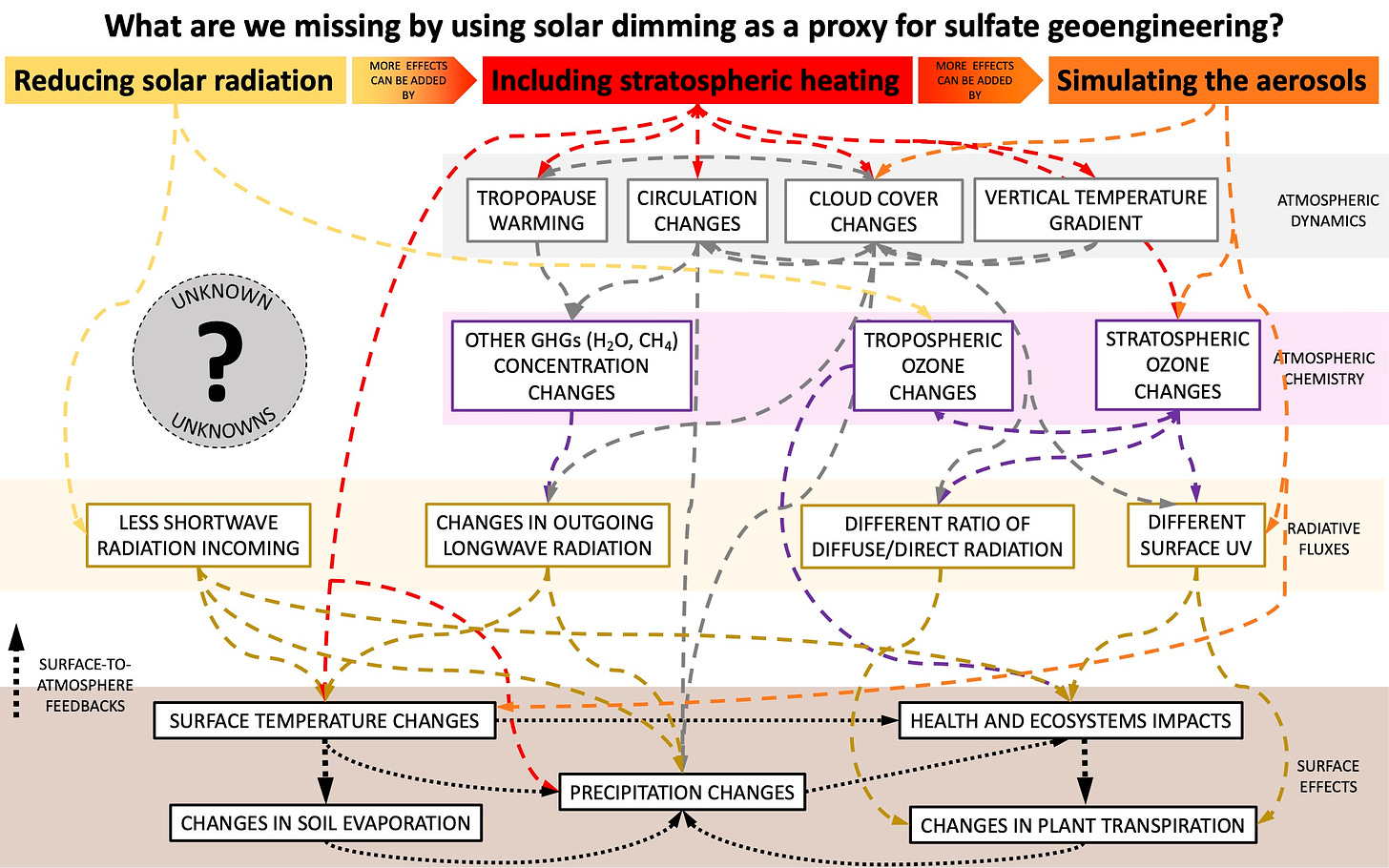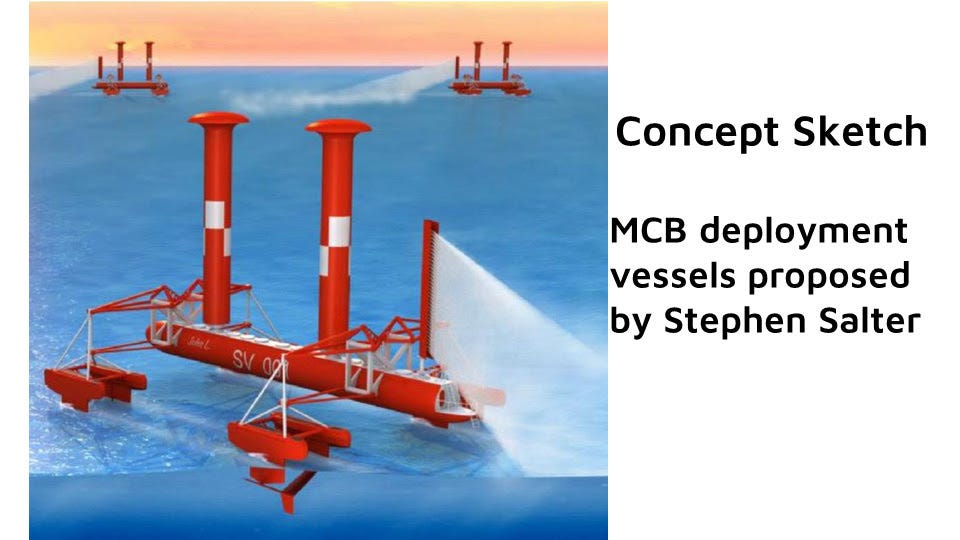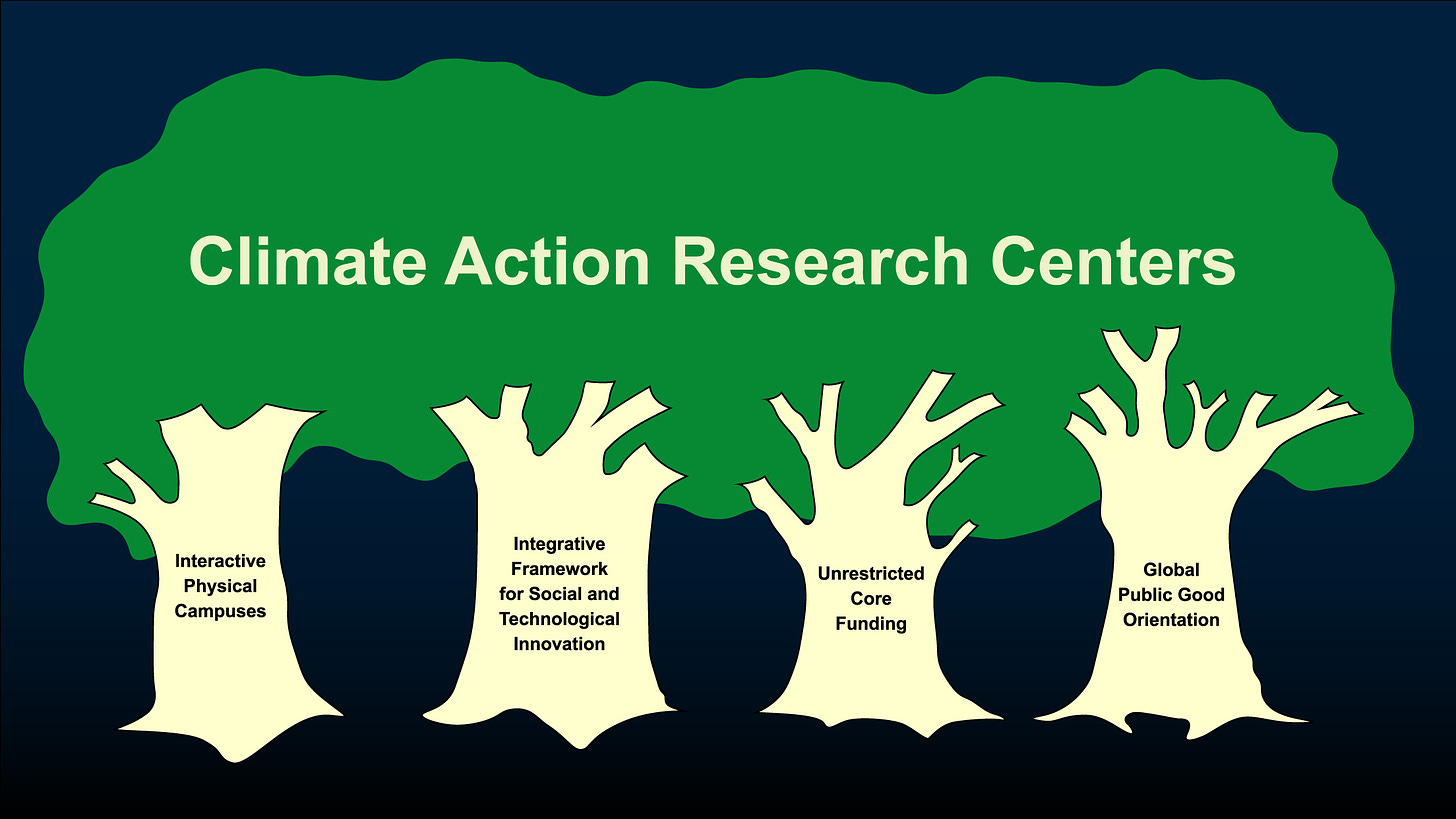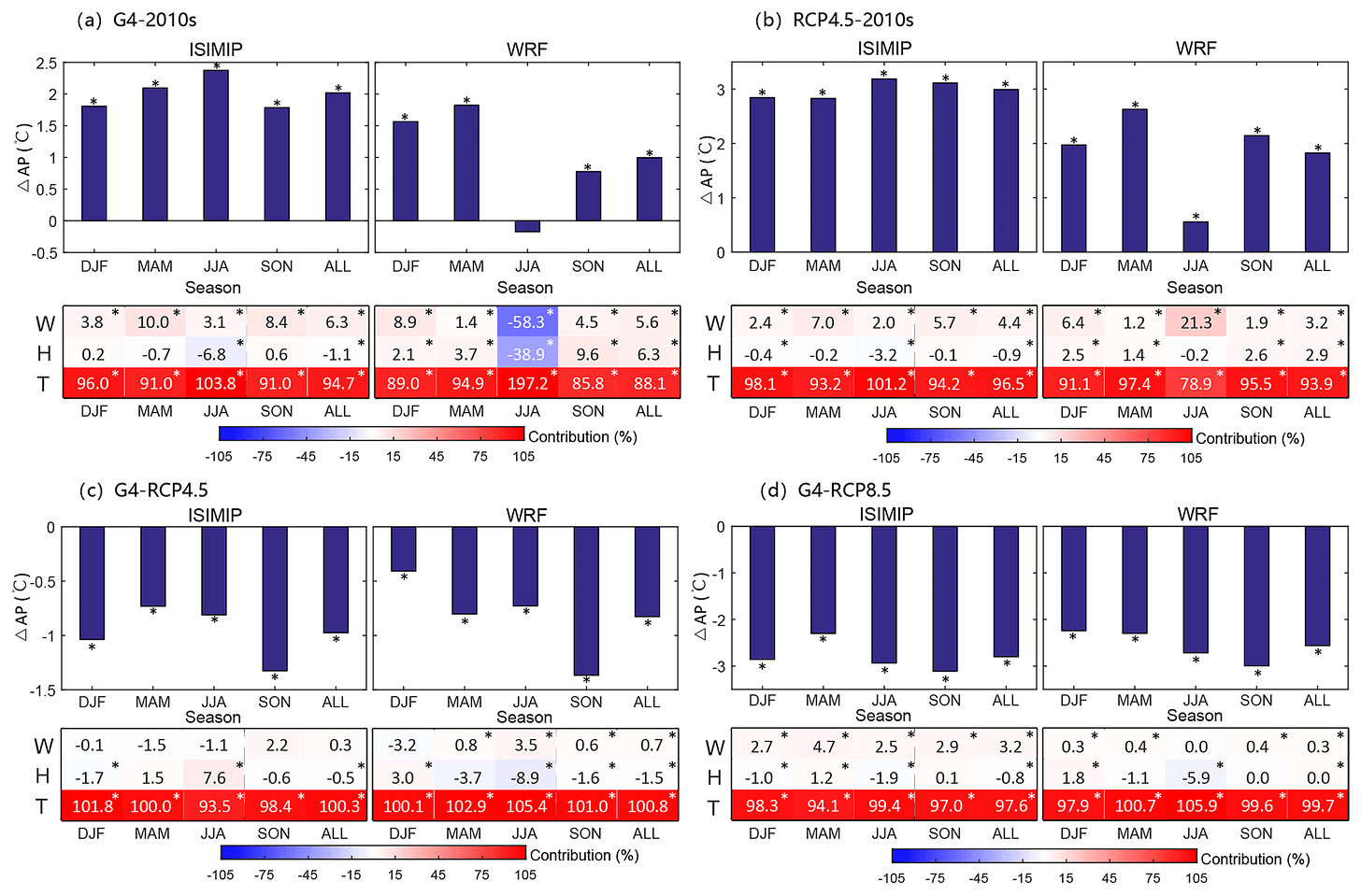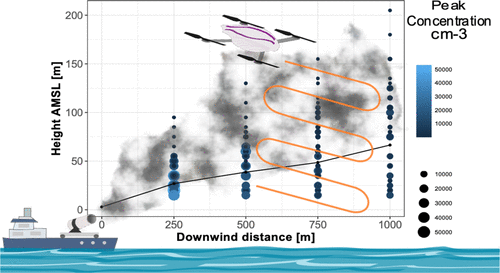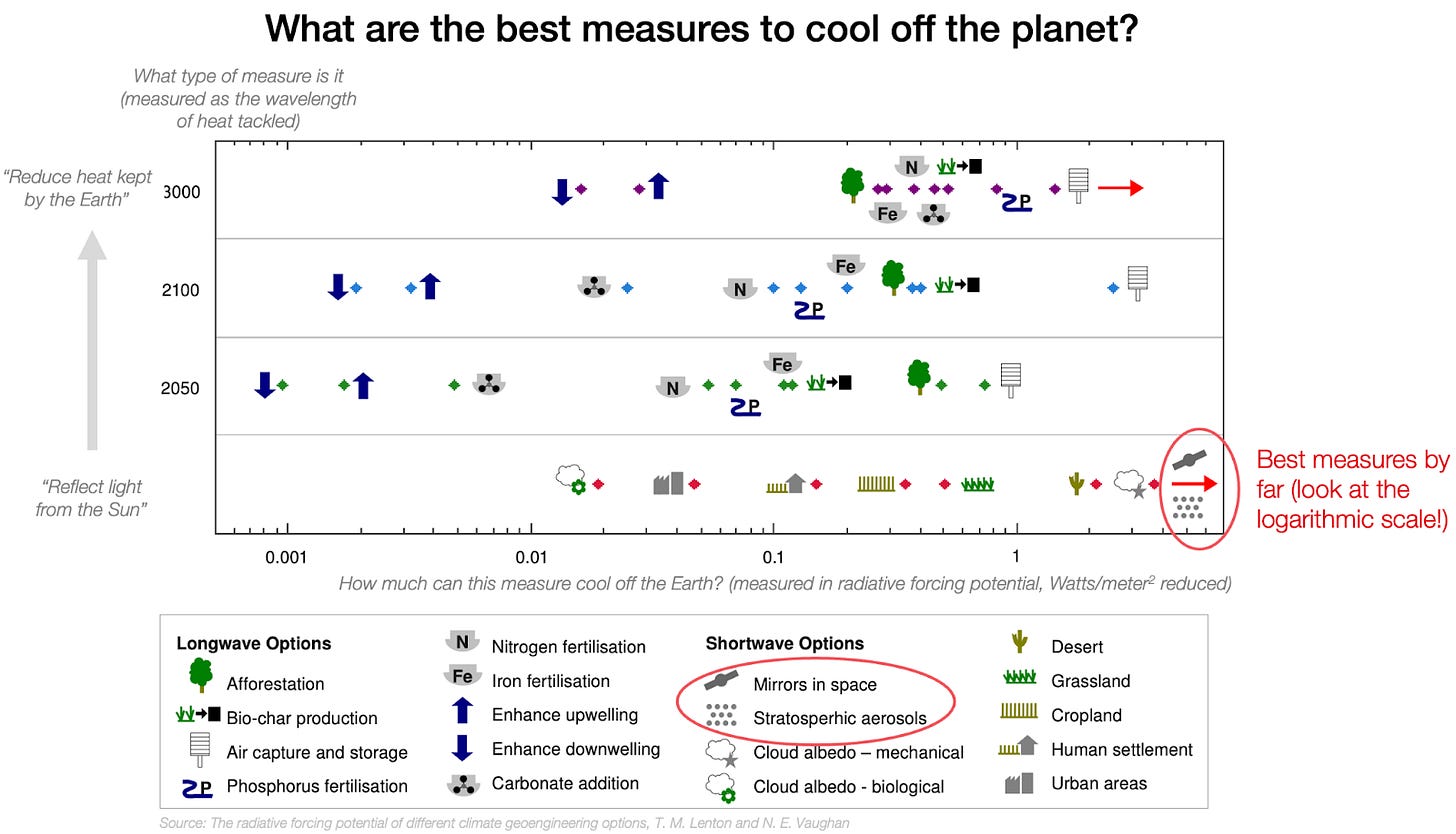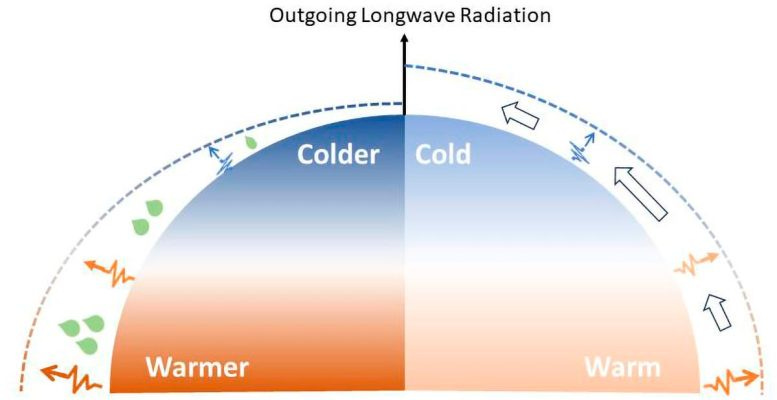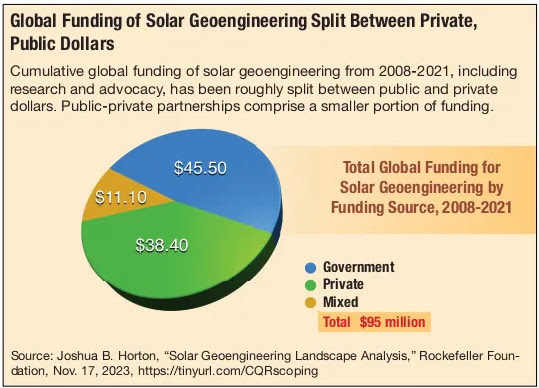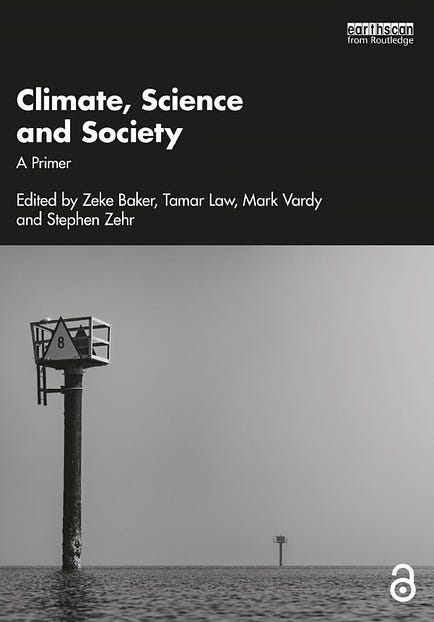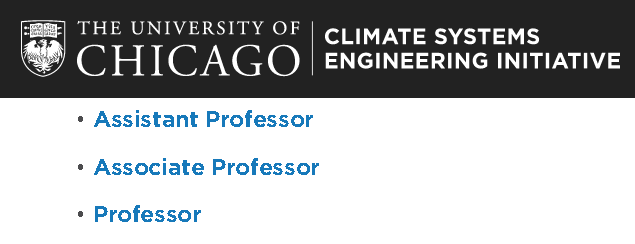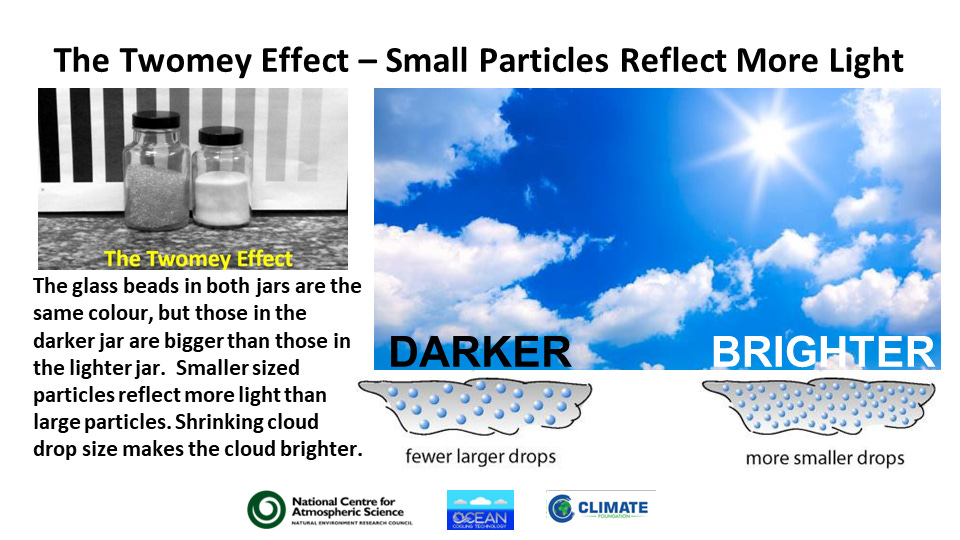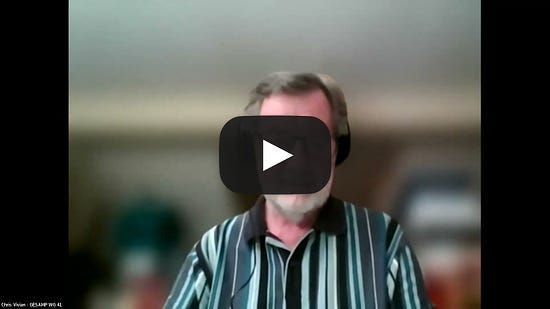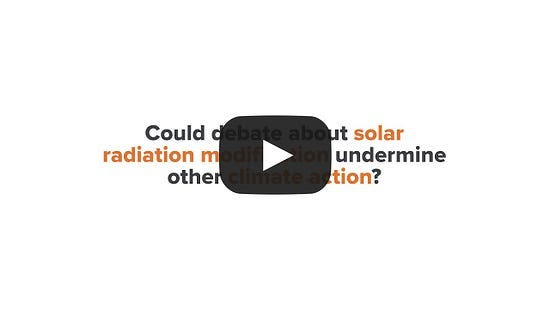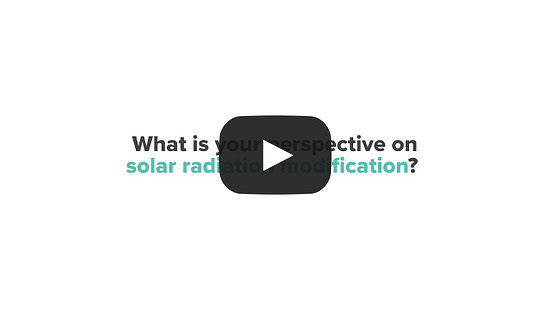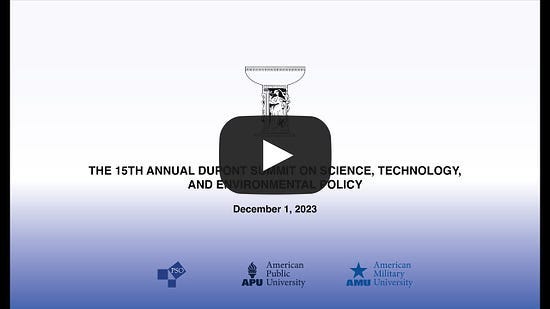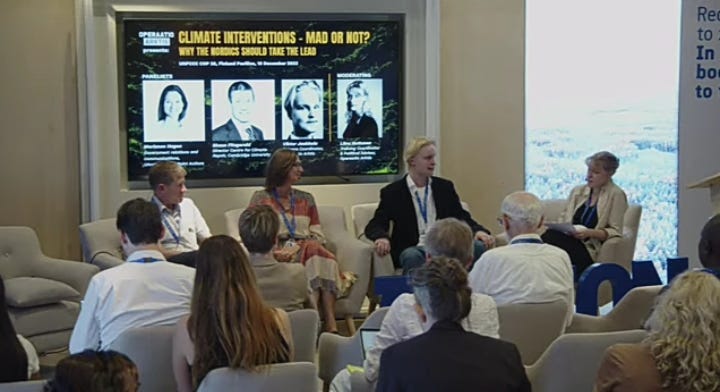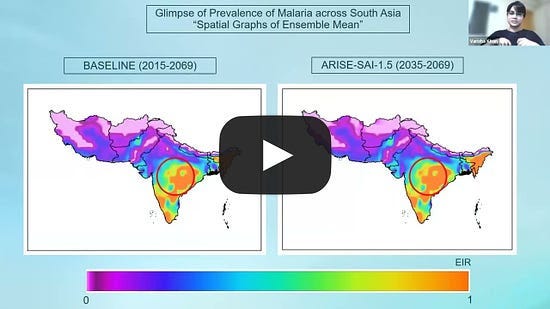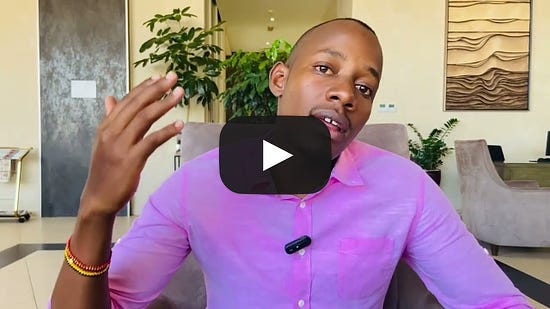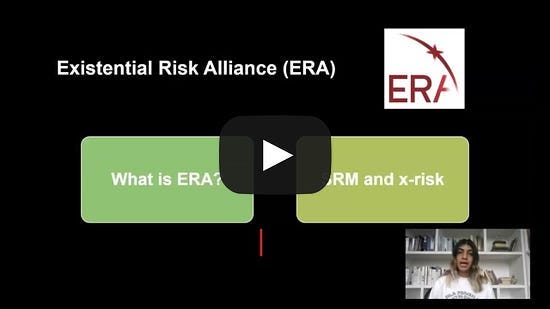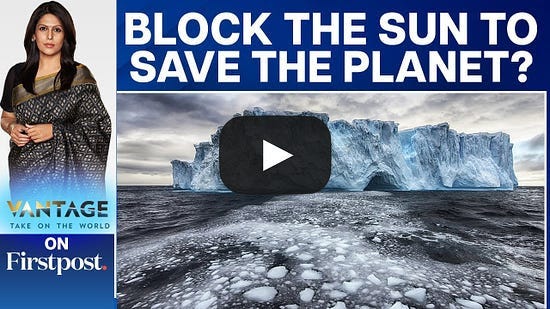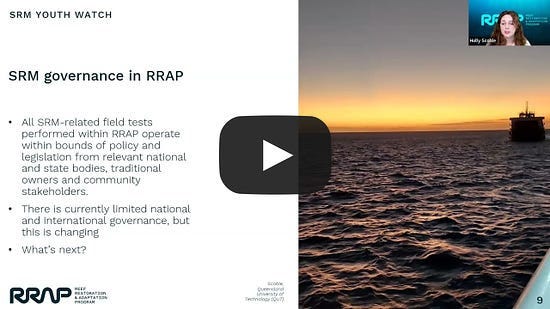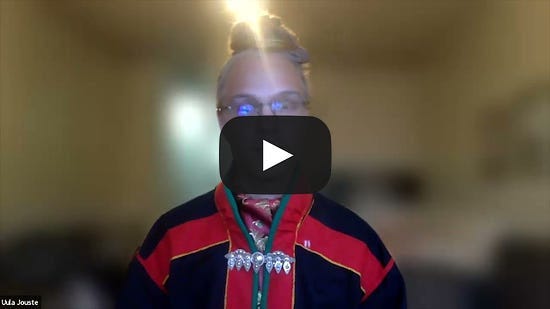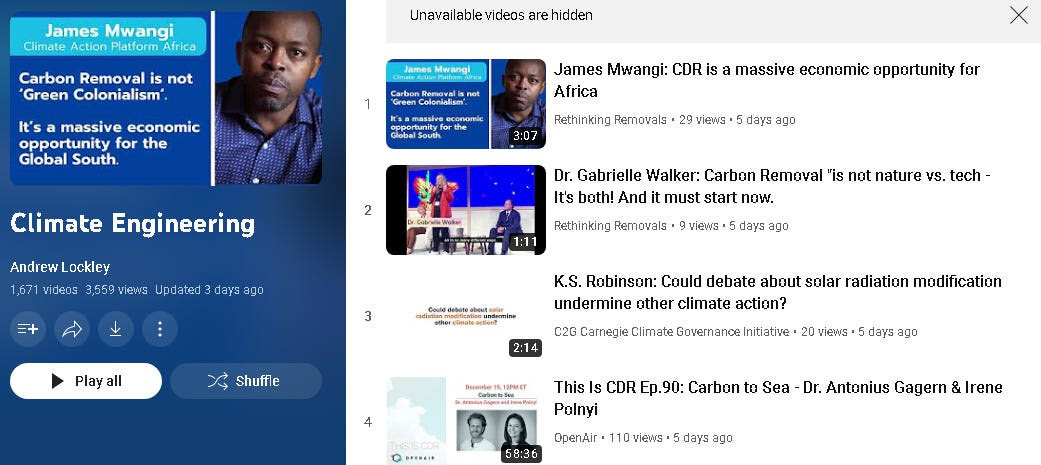The Solar Geoengineering Updates Newsletter (December'2023)
Welcome to the Solar Geoengineering Updates Newsletter, a monthly newsletter that updates you on the developments of everything SRM-related.
DEADLINES
Call for papers: Volcano-climate impacts and the stratospheric aerosol layer | Abstract Submission Deadline: 10 January 2024
EGU session on SRM: Advances in Solar Radiation Modification Research | Deadline: 10 January 2024
Call for Papers: Special Collection-Towards a Risk-Risk-Assessment of Solar Radiation Modification | Deadline for manuscript submissions: 31 May 2024
The Climate Intervention Environmental Impact Fund (CIEIF) announced another round of three grants for the first half of 2024 with increased award amounts of $65,000 each | Application Deadline: 01 June 2024
FUNDING REQUEST
Marine Cloud Rebrightening Project by Rebrighten.org
RESEARCH PAPERS
Sensitivity of Arctic Surface Temperature to Including a Comprehensive Ocean Interior Reflectance to the Ocean Surface Albedo Within the Fully Coupled CESM2
Wei, J., Ren, T., Yang, P., DiMarco, S. F., & Huang, X. (2023). Sensitivity of Arctic surface temperature to including a comprehensive ocean interior reflectance to the ocean surface albedo within the fully coupled CESM2. Journal of Advances in Modeling Earth Systems, 15(12), e2023MS003702.
Robust acceleration of Earth system heating observed over the past six decades
Minière, A., von Schuckmann, K., Sallée, J. B., & Vogt, L. (2023). Robust acceleration of Earth system heating observed over the past six decades. Scientific Reports, 13(1), 22975.
Identifying climate impacts from different Stratospheric Aerosol Injection strategies in UKESM1
Alice Florence Wells, Matthew Henry, Ewa M. Bednarz, et al. Identifying climate impacts from different Stratospheric Aerosol Injection strategies in UKESM1. ESS Open Archive . December 27, 2023.
Assessing the Impact of Stratospheric Aerosol Injection on US Convective Weather Environments
Glade, I., Hurrell, J. W., Sun, L., & Rasmussen, K. L. (2023). Assessing the impact of stratospheric aerosol injection on US convective weather environments. Earth's Future, 11(12), e2023EF004041.
Using historical temperature to constrain the climate sensitivity and aerosol-induced cooling
Morgenstern, O. (2023). Using historical temperature to constrain the climate sensitivity and aerosol-induced cooling. EGUsphere, 2023, 1-23.
Chemical Impact of Stratospheric Alumina Particle Injection for Solar Radiation Modification and Related Uncertainties
Vattioni, S., Luo, B., Feinberg, A., Stenke, A., Vockenhuber, C., Weber, R., ... & Chiodo, G. (2023). Chemical impact of stratospheric alumina particle injection for solar radiation modification and related uncertainties. Geophysical Research Letters, 50(24), e2023GL105889.
Relationships between Aerosols and Marine Clouds during the “Godzilla” Dust Storm: Perspective of Satellite and Reanalysis Products
Chang, C. H., & Hosseinpour, F. (2023). Relationships between Aerosols and Marine Clouds during the “Godzilla” Dust Storm: Perspective of Satellite and Reanalysis Products. Atmosphere, 15(1), 13.
Climate intervention using marine cloud brightening (MCB) compared with stratospheric aerosol injection (SAI) in the UKESM1 climate model
Haywood, J. M., Jones, A., Jones, A. C., Halloran, P., & Rasch, P. J. (2023). Climate Intervention using marine cloud brightening (MCB) compared with stratospheric aerosol injection (SAI) in the UKESM1 climate model. Atmospheric Chemistry and Physics, 23(24), 15305-15324.
The Indonesian Throughflow circulation under solar geoengineering
Shen, C., Moore, J. C., Kuswanto, H., & Zhao, L. (2023). The Indonesian Throughflow circulation under solar geoengineering. Earth System Dynamics, 14(6), 1317-1332.
Solar geoengineering research in the global public interest: A proposal for how to do it
Buck, H. J., & Nicholson, S. (2023). Solar geoengineering research in the global public interest: A proposal for how to do it. One Earth, 6(12), 1652-1664.
Potential Impact of Stratospheric Aerosol Geoengineering on Cocoa Suitability in Nigeria
Egbebiyi, T. S., Lennard, C., Izidine, P., Odoulami, R. C., Wiolski, P., & Makinde, A. I. (2023). Potential of Impact of Stratospheric Aerosol Geoengineering on Cocoa Suitability in Nigeria.
Systemic risks and solar climate engineering research. Integrating technology ethics into the governance of systemic risks
Hofbauer, B. (2023). Systemic risks and solar climate engineering research. Integrating technology ethics into the governance of systemic risks. Journal of Risk Research, 1-13.
Changes in apparent temperature and PM2.5 around the Beijing–Tianjin megalopolis under greenhouse gas and stratospheric aerosol intervention scenarios
Wang, J., Moore, J. C., & Zhao, L. (2023). Changes in apparent temperature and PM 2.5 around the Beijing–Tianjin megalopolis under greenhouse gas and stratospheric aerosol intervention scenarios. Earth System Dynamics, 14(5), 989-1013.
A Quasi-Linear Relationship between Planetary Outgoing Longwave Radiation and Surface Temperature in a Radiative-Convective-Transportive Climate Model of a Gray Atmosphere
Sun, J., Secor, M., Cai, M., & Hu, X. (2024). A Quasi-Linear Relationship between Planetary Outgoing Longwave Radiation and Surface Temperature in a Radiative-Convective-Transportive Climate Model of a Gray Atmosphere. Advances in Atmospheric Sciences, 41(1), 8-18.
Assessment of Global Warming and of Mitigation Methods Using Albedo Enhancement from Algae, Cloud, and Land
Lightburn, Kenneth D. "Can a Symbolic Mega-Unit of Radiative Forcing (RF) Improve Understanding and Assessment of Global Warming and of Mitigation Methods Using Albedo Enhancement from Algae, Cloud, and Land (AEfACL)?." Climate 11.3 (2023): 62.
A Numerical Modeling Study on the Earth’s Surface Brightening Effect of Cirrus Thinning
Shi, X., Liu, Y., & Liu, J. (2023). A Numerical Modeling Study on the Earth’s Surface Brightening Effect of Cirrus Thinning.
Governing Emerging Solar Geoengineering: A Role for Risk-Risk Evaluation?
McLaren, D. (2023). Governing Emerging Solar Geoengineering: A Role for Risk-Risk Evaluation?. Georgetown Journal of International Affairs, 24(2), 234-243.
Developing Proposals for Ethically Informed Operational Guidelines for Climate Engineering Technologies
Brooks, L., Cannizzaro, S., Bhalla, N., & Richardson, K. (2023, December). Developing Proposals for Ethically Informed Operational Guidelines for Climate Engineering Technologies. In IFIP Joint Working Conference on the Future of Digital Work: The Challenge of Inequality (pp. 28-49). Cham: Springer Nature Switzerland.
Evaporative Cooling Does Not Prevent Vertical Dispersion of Effervescent Seawater Aerosol for Brightening Clouds
Hernandez-Jaramillo, D. C., Harrison, L., Kelaher, B., Ristovski, Z., & Harrison, D. P. (2023). Evaporative Cooling Does Not Prevent Vertical Dispersion of Effervescent Seawater Aerosol for Brightening Clouds. Environmental Science & Technology.
Solar Radiation Modification Governance in the Context of Temperature Overshoot
Pasztor, J. (2023). Solar Radiation Modification Governance in the Context of Temperature Overshoot. New England Journal of Public Policy, 35(2), 7.
Presenting balanced geoengineering information has little effect on mitigation engagement
Merk, Christine and Gernot Wagner. “Presenting balanced geoengineering information has little effect on mitigation engagement.” Climatic Change (Forthcoming).
A review of the effects of solar radiation management on hydrological extremes
Tew, Y. L., Tan, M. L., Liew, J., Chang, C. K., & Muhamad, N. (2023, September). A review of the effects of solar radiation management on hydrological extremes. In IOP Conference Series: Earth and Environmental Science (Vol. 1238, No. 1, p. 012030). IOP Publishing.
Exploring the academic perceptions of climate engineering in developing countries
Hussain, A., Sipra, H. F., Waheed, A., & Ukhurebor, K. E. (2024). Exploring the academic perceptions of climate engineering in developing countries. Atmósfera, 38, 311-325.
WEB POSTS
Scientists mull Solar Radiation Management – a potential climate-change stop-gap (The Register)
We Can Already Stop Climate Change If We Want To (Uncharted Territories)
Pinhole propulsion for satellites (Phys.Org)
Geoengineering Antarctica: Can Aerosol Injection Save the Ice? (Sci Tech Daily)
Scientists Are Coming Around on Geoengineering (Heatmap)
SilverLining Welcomes Progress at COP28, But Calls for More Ambitious Near-term Climate Action & Research On Climate Intervention (Silver Lining)
Harvard awards two Degrees scientists groundbreaking funding for SRM research (The Degrees Initiative)
Unlocking Climate Secrets: The Hidden Physics Behind Temperature and Radiation (Sci-Tech Daily)
Harvard CID Announces Recipients of 2023 GEM Incubation Fund, Supporting Climate Research and Policy Impact in Developing Countries (Harvard University)
Cornell Climate Engineering Group - what happened in 2023 (Cornell University)
New reports bolster case for research into controversial earth-cooling geoengineering (Science Business)
Why dimming the Sun would be an effective tool in the fight against climate change (The Conversation)
500+ pages, 200+ researchers: Global Tipping Points Report delivers a comprehensive assessment of tipping point risks and societal opportunities (PIK)
'Forcing' the issue—Make Sunsets' raison d'etre, namely to shift the narrative surrounding solar radiation management (Keep Cool)
THESES
Cloudier Skies: Marine Cloud Brightening: How Sea Salt Aerosol Properties Relate to the Brightening Of Stratocumulus Clouds
Colonizing the climate?: A decolonial critical analysis of the global scientific discourse on solar geoengineering
Effect of stratospheric aerosol injection strategy on radiative forcing and precipitation
Assessing the Impact of Stratospheric Aerosol Injection on Convective Weather Environments in the United States
REPORTS
Nov 2023 C2G Impact and Learning Report (C2G)
Geoengineering Solutions: Should such technologies be used to help curb climate change?
Managing our climate and weather through responsible engineering
BOOK
Climate, Science and Society
JOB OPPORTUNITIES
Postdoc position: AI weather emulators for geoengineering at Department of Geophysical Sciences, The University of Chicago | Deadline: 01 February 2024
“The University of Chicago’s Climate Systems Engineering initiative ( David Keith) and Climate Extremes Theory and Data Group (PI: Pedram Hassanzadeh) are looking for a highly motivated postdoctoral fellow to work on developing AI-based weather emulators and hybrid models for solar geoengineering including different climate conditions (CO2 levels, aerosol loading, etc.). A particular focus is on understanding changes in the characteristics of extreme weather events. The projects involves a multidisciplinary collaboration among experts in climate science, scientific ML, and climate modeling.”
Programmes Officer at The Degrees Initiative | Remote within the United Kingdom
“The Degrees Initiative is a UK-based charity that builds the capacity of developing countries to evaluate solar radiation modification (SRM) climate engineering, a controversial proposal for reducing some of the impacts of climate change. The Degrees Initiative is neutral on whether SRM should ever be used, but we believe that developing countries should be empowered to conduct their own research and to play a central role in SRM discussions. The initiative has been registered as a UK charity since 2021, but it has been operating for ten years as the Solar Radiation Management Governance Initiative (SRMGI) and its work has received widespread acclaim.”
UCL Earth Sciences Ph.D. scholarship | Application Deadline: 29 January 2023
“UCL Earth Sciences is engaged in world-class research into the processes at work on and within the Earth and other planets. The department has strong links with resources and hazard risk industries, with most graduates finding employment within academia or geoscience-related industries. Awardees are free to engage in research in any Geoscience-related field from the surface to the core, from Earth to planets. The primary advisor must be an academic staff member of UCL Earth Science. Candidates should contact potential primary advisors to discuss potential projects. The research interests of potential supervisors are listed on the Dept webpages (follow the links to the webpages of academic staff members). Secondary advisors can be outside the Earth Sciences Department, but have to be affiliated UCL with the University of London.
Candidates can outline their own projects with the guidance of potential supervisors, and/or focus on a project suggested by them. The details of the project can be further developed after the application deadline; only a very brief outline needs to be included in the application statement. Projects can potentially be changed after the award has been issued, with permission of the Department.”
Faculty Jobs at the University of Chicago
“The University of Chicago invites applications from scholars who will make significant contributions to Climate Systems Engineering. The University is building a world-leading Climate Systems Engineering initiative with multiple faculty hires addressing solar geoengineering, open-system carbon removal such as enhanced weathering, and interventions to limit loss of glacial ice. We seek individuals who will lead research programs that will produce significant contributions to their field and to this research initiative.
Applications are welcome from all relevant academic disciplines including the physical and biological sciences, social sciences, engineering, and humanities at the rank of tenure-track Assistant Professor. Applications are welcome from scholars who have not previously worked on climate systems engineering and from scholars who focus on the physical or social risks of Climate Systems Engineering. Appointments will be made in an appropriate primary department based on field, with secondary appointment(s) in another unit possible.
Research on Climate Systems Engineering is inherently interdisciplinary, so we seek individuals with a track record of collaboration beyond their discipline; the University’s culture is highly collaborative.”
DISCUSSIONS
Tipping Points, the need for an international NGO and David Keith’s take on tipping points
SRM FIRM
Rebrighten.org
PODCASTS
How to support a sunshade - Maheswaran | Reviewer 2 does geoengineering
“How can you make a sunshade stay in place? How can you make it beam down solar power to Earth? @geoengineering1 finds out from Tharshan Maheswaran.
Paper - International planetary sunshade concept with a function-integrated and scalable support structure based on coreless filament winding. DOI 10.1088/1742-6596/2526/1/012113”
Festive Holly (Jean Buck) | Reviewer 2 does geoengineering
Celebrate Xmas day with Holly, discussing Solar geoengineering research in the global public interest: A proposal for how to do it https://www.sciencedirect.com/science/article/pii/S2590332223005481
C2GTalk: Why is it important to uphold ethics in the research on solar radiation modification? with Gabriela Ramos | Carnegie Climate Governance Initiative (C2G)
“More research is needed to explore all aspects of solar radiation modification, including the technology and its impact on society, says UNESCO's Assistant Director-General Gabriela Ramos. It is important to build public trust in the research by engaging a wide and inclusive cross-section of society, including people from the arts and humanities.
Gabriela Ramos is the assistant director-general for the social and human sciences of UNESCO, where she oversees the institution's contributions to building inclusive societies. Her mandate includes tackling economic inequalities of income and opportunity, and promoting social inclusion and gender equality.”
Babbage: Geoengineering, something new under the sun | Economist Podcasts
“The kind of emissions reductions promised in this week’s sweeping COP28 agreement will not suffice to meet the most ambitious climate goals. So other plans to slow the warming are coming to the fore. Solar geoengineering—modifying the amount of Earth’s incoming sunlight—is a once-fringe idea that is at last being taken seriously. It is a strategy with considerable promise, and considerable potential risks.
Host: Alok Jha, The Economist’s science and technology editor. Contributors: Rachel Dobbs, The Economist’s climate correspondent; Oliver Morton, a senior editor at The Economist; Douglas MacMartin, a geoengineering researcher at Cornell University; and Shuchi Talati, who leads the Alliance for Just Deliberation on Solar Geoengineering.”
David Keith on Climate Systems Engineering | Challenging Climate
“David Keith is a Professor in the Department of Geophysical Sciences at the University of Chicago and the Founding Faculty Director of the Climate Systems Engineering initiative. Keith previously led the development of Harvard’s Solar Geoengineering Research Program.
In this episode, we discuss Keith’s Climate Systems Engineering initiatives, carbon dioxide removal (CDR) and geoengineering techniques. Drawing on David’s decades of expertise, we dive deep into topics such as CDR, solar geoengineering, ice sheet geoengineering.”
Ethics of Volcano Geoengineering - Cassidy | Reviewer 2 does geoengineering
“Should the army be allowed to blow people up with a volcano? If your geothermal power plant triggers an eruption, is that just a risk of doing business? Should we fiddle with volcanoes to make them safer? Is even researching this opening a can of worms? Gideon Futurman interviews Michael Cassidy (giving @geoengineering1 a month long editing nightmare, but with results we hope you'll like).
Paper: The Ethics of Volcano Geoengineering, Michael Cassidy, Anders Sandberg, Lara Mani: https://doi.org/10.1029/2023EF003714”
A potential climate solution in the works: reflecting sunlight back into space | NPR
“NPR's Ayesha Rascoe speaks with climate scientist Peter Irvine about proposals to temper rising heat through geosolar engineering, which involves increasing the reflection of sunlight back to space.”
YOUTUBE VIDEOS
Chris Vivian Ocean Geoengineering HPAC | Robbie Tulip
“In this discussion with the Healthy Planet Action Coalition, Dr Chris Vivian addresses a range of methods of ocean cooling, with focus on the relation between iron fertilization and ocean gyres, and overall governance of marine geoengineering. His slides are available at https://www.healthyplanetaction.org/”
K.S. Robinson: Could debate about solar radiation modification undermine other climate action? | C2G Carnegie Climate Governance Initiative
“This video is an excerpt taken from the C2GTalk interview with Kim Stanley Robinson is an American science fiction writer. He is the author of about twenty books, including the internationally bestselling Mars trilogy, and more recently Red Moon, New York 2140, and The Ministry for the Future. He was part of the U.S. National Science Foundation’s Antarctic Artists and Writers’ Program in 1995 and 2016, and a featured speaker at COP-26 in Glasgow, as a guest of the UK government and the UN. His work has been translated into 28 languages, and won awards including the Hugo, Nebula, and World Fantasy awards. In 2016 asteroid 72432 was named “Kimrobinson.”
What is your perspective about Solar Radiation Modification? | SRM Youth Watch
“Irfan Ullah shares why young people's involvement in discussions on solar radiation modification and its governance is crucial.
Irfan Ullah is the Founder of Sustainability Week Pakistan. He has a Joint master's degree in Geography of Environmental Risk and Human Security from the United Nations University; Institute of Environment and Human Security (UNU-EHS), and University of Bonn, Germany. He is also a SilverLining International Strategy Fellow.”
The sociotechnical dynamics of negative emissions, carbon removal, and solar geoengineering | Policy Studies Organization
Climate Interventions – Mad or not? Why Nordics Should Take Lead – Operaatio Arktis @COP28 | Operaatio Arktis
“Climate Interventions are necessary if we are to stay below 1.5 °C and avoid crossing multiple earth system tipping points. The severe and irreversible threats from crossing these tipping points pose a great challenge for near-term climate policy. Yet, Climate Interventions are largely dismissed in policy making and under-researched in academia. Many uncertainties about Climate Interventions remain, but there is still a significant chance of preventing major climate impacts and collapses in Earth systems with these measures.
Marianne Hagen (UArctic) and Dr. Shaun Fitzgerald OBE FREng (Cambridge University) join youth-led activist group Operaatio Arktis to discuss the role of Nordic countries in solar radiation management and ice sheet conservation research, development and their governance. Join us as we delve into a new way of looking at climate action and open a necessary conversation with the young generation’s voice at the center.”
What are your findings on stratospheric aerosol injection's impact on malaria in South India | SRM Youth Watch
“Varisha Khan shares insights into her research findings on the impact of stratospheric aerosol injection on malaria in South India.
Varisha Khan is an MSc student of Health Informatics working as a Research Associate under a project at COMSATS University, Islamabad. The institute has a leading team devoted to climate action in the context of geoengineering, focusing on the Global South. Varisha’s goal is to scrutinise the “Trade-off Based Impacts of SRM on Malaria Distribution across South Asia, particularly Pakistan”.”
Crispus Mwemaho: An Insightful Perspective on Solar Radiation Modification Research and Governance | SRM Youth Watch
“Crispus Mwemaho a climate activist and founder of Kampala Climate Cafe shares his perspectives on Solar Radiation Modification Research and governance during a recent interview with SRM YW.”
What is X-risk and how does solar radiation modification become relevant in this field? | SRM Youth Watch
“Trisha Patel explains what X-risk is and how solar radiation modification become relevant in the field at the launch event of SRM YW during New York Climate Week.
Trisha Patel holds an MSc in Climate Change and Sustainable Development and is a research associate for a Degrees Initiative project exploring the impacts of SRM on human health and biodiversity. In tandem, she's a fellow with the Existential Risk Alliance, investigating the interplay between SRM and global catastrophic risk. Trisha has published on SRM in South Africa, the geopolitics of SRM and public perceptions of climate change. In her free time, she draws abstract art and is an avid reader of sci-fi novels.”
America Wants to Block the Sun: Is US Playing with Fire? | Vantage with Palki Sharma | Firstpost
“America Wants to Block the Sun: Is US Playing with Fire? | Vantage with Palki Sharma
The Biden administration wants to study altering sunlight. The U.S. wants to research a phenomenon called solar radiation modification. It may want to undertake solar experimentation in the future. But this concept is extremely controversial. For starters, it could abruptly increase temperatures. So is the U.S. playing with fire? Or can blocking the Sun help reverse the effects of climate change. Palki Sharma tells you.”
Andy Reisinger: How could the world govern new approaches to tackle climate change? | C2G Carnegie Climate Governance Initiative
“The world is due to exceed 1.5°C warming, and countries will face more extreme consequences in the near -term, warns Andy Reisinger in a C2GTalk. Significant levels of carbon dioxide removal will be required, and policies are needed to reduce adverse consequences. Solar radiation modification is more uncertain, and would reflect a failure of global governance to cut emissions. Andy Reisinger is an independent consultant specialising in the science-policy interface of climate change, with particular expertise in livestock agriculture and the role of methane as part of mitigation strategies. He was vice-chair of Working Group III (Mitigation) of the Intergovernmental Panel on Climate Change (IPCC) during its 6th Assessment cycle completed in 2023, and previously served as coordinating lead author in the IPCC focusing on impacts and adaptation for Australia and New Zealand. He currently is also one of eight Commissioners on the New Zealand Climate Change Commission, an independent expert body providing advice on adaptation and mitigation policies to the government. Prior to this, Andy served as Principal Scientist, Climate Change, at the Ministry for the Environment, and as Deputy Director (International) of the New Zealand Agricultural Greenhouse Gas Research Centre, focusing on international research collaboration to reduce New Zealand’s and global agricultural greenhouse gas emissions. His research focuses on the role of agriculture in domestic and international climate change policy, the treatment of methane as part of comprehensive climate policies, climate risk and adaptation strategies, and the implications of uncertainty for decision-making.”
Planetary Restoration Action Group 4 December 2023 | Robbie Tulip
“Discussion on COP 28, SAI, MCB, climate strategy.”
What is the future of Solar Radiation Modification research in Australia? | SRM Youth Watch
“Holly Scoble shares insights on the future of solar radiation modification research in Australia during the SRM Youth Watch launch event in New York.
Holly Scoble is a Master’s student at QUT (Queensland University of Technology), which is a research partner within the Reef Restoration and Adaptation Program (RRAP). Her background is in environmental science, and her focus within her research project is applying marine cloud brightening and fogging technologies to targeted areas within the Great Barrier Reef as a way to prevent coral mortality from heat stress and bleaching events.”
Why are indigenous peoples' perspectives important? | SRM Youth Watch
“Uula Jouste shares insights on why indigenous people’s perspectives are important in the governance of SRM at the SRM Youth Watch Launch event during New York Climate Week.
Uula Jouste is a 22-year-old northern sámi who studies microbiology at the University of Helsinki. He works for Operaatio Arktis – a youth organisation whose goal is to promote discussion and ethical research on climate intervention techniques in Finland and abroad. They are based in Helsinki and are mainly focused on preserving the Arctic summer sea ice.”




